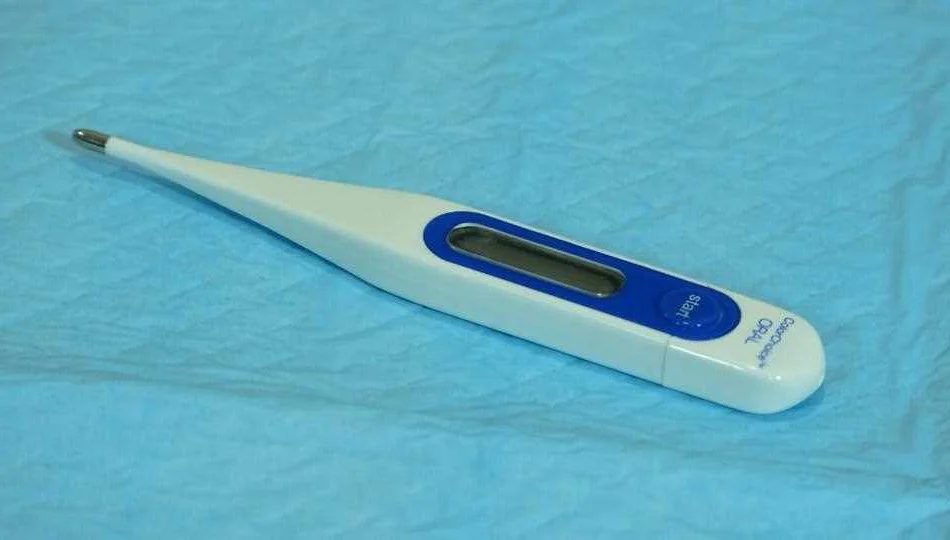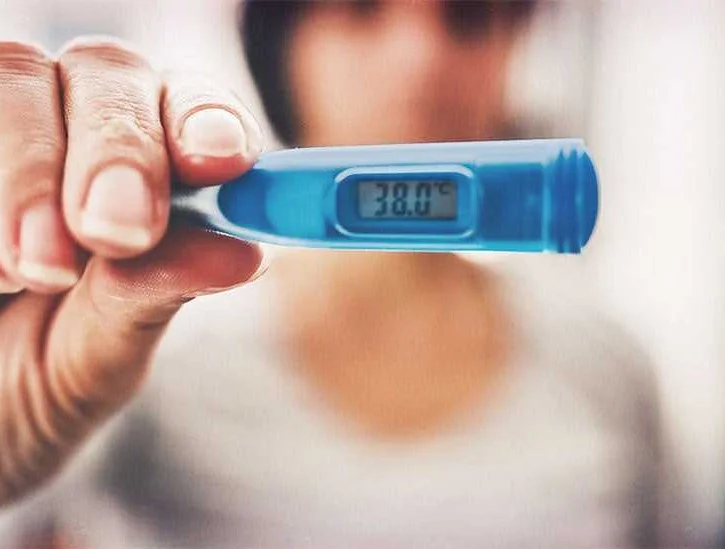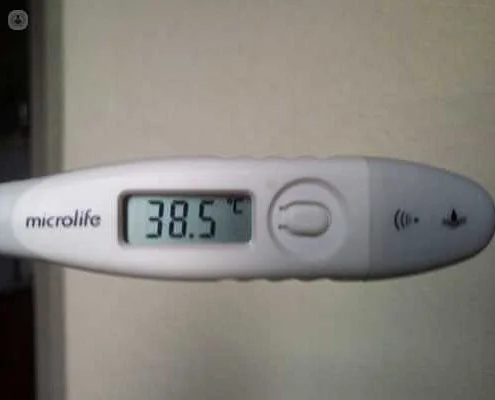Temperature 38 without symptoms
Содержимое
If you have a temperature of 38 degrees Celsius without any symptoms, it could be a sign of an underlying health condition or a mild infection. Learn about possible causes and when to seek medical attention.
Having a temperature of 38 degrees Celsius without any symptoms can be concerning. While a slight increase in body temperature is usually a sign that the immune system is fighting off an infection, it is important to understand the possible causes and when it is necessary to seek medical advice.
Causes of a temperature of 38 without symptoms
There are several possible reasons why someone may have a temperature of 38 degrees Celsius without any apparent symptoms. One common cause is a viral or bacterial infection that is in its early stages. In these cases, the body may be fighting off the infection before symptoms have fully developed.
It is also possible for the body to have an elevated temperature due to external factors, such as being in a hot environment or engaging in physical activity. In these situations, the temperature should return to normal once the person cools down or rests.
Another potential cause is a medication or vaccine reaction. Certain medications or vaccinations can cause a temporary increase in body temperature as a side effect. If this is the case, the temperature should return to normal once the medication or vaccine has been metabolized by the body.
When to see a doctor
If you have a temperature of 38 degrees Celsius without any symptoms, it is generally not a cause for immediate concern. However, it is still important to monitor your temperature and look out for any developing symptoms.
It is advisable to see a doctor if the temperature persists for more than a few days or if symptoms such as cough, sore throat, body aches, or difficulty breathing develop. These could be signs of an underlying infection or illness that requires medical attention.
If you have a weakened immune system, such as due to a chronic illness or medication, or if you are pregnant, it is important to seek medical advice sooner rather than later. These individuals may be more susceptible to complications from infections, and it is better to be proactive in their case.
In conclusion, having a temperature of 38 degrees Celsius without any symptoms can have various explanations. While it is often a sign of the immune system at work, it is crucial to pay attention to any developing symptoms and seek medical advice if necessary.
Temperature 38 without symptoms

A temperature of 38 degrees Celsius without any symptoms can be a cause for concern. While a low-grade fever can sometimes be harmless and resolve on its own, it is important to monitor the situation and seek medical advice if necessary.
In some cases, a temperature of 38 without symptoms could indicate an underlying infection or inflammation in the body. It may be a sign that the immune system is responding to an infection, even if the specific symptoms are not yet apparent.
It is crucial to pay attention to any other changes in your body, such as fatigue, loss of appetite, or body aches, as these could be early signs of an illness. Additionally, if you have been in contact with someone who is sick or have recently traveled to an area with a high prevalence of certain diseases, it is important to mention this to your healthcare provider.
If your temperature remains elevated or if you develop any symptoms, it is recommended to consult a healthcare professional. They will be able to evaluate your condition, conduct any necessary tests, and provide appropriate treatment if needed.
Until you see a doctor, it is important to stay hydrated, get plenty of rest, and avoid close contact with others to prevent the spread of any potential infection.
In conclusion, a temperature of 38 degrees Celsius without symptoms should not be ignored. While it may be nothing serious, it is always better to err on the side of caution and seek medical advice to rule out any underlying health issues.
Understanding the cause
When experiencing a temperature of 38 degrees without any accompanying symptoms, it is important to try and understand the underlying cause. While a slightly elevated temperature can be a normal response to certain situations, such as exercise or hot weather, a persistent high temperature without any apparent reason may indicate an underlying health issue.
There are several potential causes for an unexplained temperature of 38 degrees:
Infection: Infections, such as viral or bacterial infections, are one of the most common reasons for an elevated temperature. Even if you do not experience any other symptoms initially, an infection may develop later. It is important to monitor your temperature and seek medical attention if it persists or worsens.
Inflammatory conditions: Certain inflammatory conditions, such as arthritis or autoimmune disorders, can cause a low-grade fever. If you have a history of such conditions, it is important to mention it to your healthcare provider.
Medication side effects: Some medications can cause a slight increase in body temperature as a side effect. If you recently started a new medication, it is worth checking the label or consulting your healthcare provider to see if this could be the cause.
Hormonal changes: Fluctuations in hormone levels, such as those occurring during the menstrual cycle or menopause, can sometimes lead to a mild fever. Monitoring your temperature over a few days and keeping track of any other symptoms can help determine if this is the case.
Environmental factors: It is also possible that external factors, such as a warm environment or excessive clothing, could be contributing to the higher temperature. Make sure to take your temperature in a comfortable and consistent environment to rule out any external influences.
If you are concerned about your temperature of 38 degrees without symptoms, it is always best to consult a healthcare professional. They will be able to evaluate your individual situation, consider your medical history, and perform any necessary tests to determine the cause and provide appropriate treatment if needed.
Possible health conditions

A temperature of 38 degrees without any symptoms may indicate various health conditions. It is important to consider other factors and symptoms that may be present in order to determine the cause. Here are some possible health conditions that could be associated with a temperature of 38 degrees:
1. Infection: A low-grade fever can be a sign of an underlying infection in the body. This could be a viral or bacterial infection, such as the common cold, flu, urinary tract infection, or an ear infection. It is important to monitor other symptoms such as cough, sore throat, body aches, or painful urination.
2. Inflammation: Inflammation in the body can also result in a low-grade fever. Conditions such as arthritis, sinusitis, or an inflammatory bowel disease can cause elevated body temperature without other noticeable symptoms.
3. Autoimmune disorders: Some autoimmune disorders, like lupus or rheumatoid arthritis, can cause a persistent low-grade fever as one of the presenting symptoms. These conditions occur when the immune system mistakenly attacks the body’s own tissues.
4. Medications: Certain medications, such as antibiotics or antihistamines, can cause a slight increase in body temperature as a side effect. If you have recently started taking any new medications, it is important to check if a low-grade fever is listed as a potential side effect.
5. Stress or anxiety: Mental and emotional stress can also impact body temperature. In some cases, increased stress levels or anxiety can cause a slight elevation in body temperature without any other symptoms.
If you have a temperature of 38 degrees without any symptoms, it is recommended to monitor your temperature closely and observe for the development of any additional symptoms. If the fever persists, worsens, or is accompanied by other concerning symptoms, it is advisable to consult a healthcare professional for further evaluation and guidance.
When to be concerned

If your temperature is consistently 38 degrees Celsius without any obvious symptoms, it may be a sign of an underlying health issue. In such cases, it is important to consult a doctor for a proper diagnosis and treatment.
Here are some situations when you should be concerned and seek medical attention:
- If your temperature remains elevated for more than 48 hours
- If you experience severe symptoms such as coughing, difficulty breathing, chest pain, or confusion
- If you have a weakened immune system or are undergoing treatment that suppresses your immune system
- If you have recently traveled to a region with known infectious diseases
- If you have been in close contact with someone who has a confirmed case of a contagious illness
- If you have a history of chronic medical conditions, such as heart disease, diabetes, or lung disease
Remember, a temperature of 38 degrees Celsius alone may not always indicate a serious condition, but it is always better to err on the side of caution and seek medical advice if you are concerned.
Consulting a healthcare professional

If you have a temperature of 38 degrees Celsius without any symptoms, it is recommended to consult a healthcare professional. While a low-grade fever can sometimes be caused by a minor infection or an underlying condition, it is important to rule out any potential serious health issues.
A healthcare professional will be able to perform a thorough evaluation and physical examination to determine the cause of your fever. They may also ask you about your medical history and any recent travel or exposure to infectious diseases.
In some cases, further tests may be necessary, such as blood tests, urine tests, or imaging studies, to help identify the underlying cause of your fever. Depending on the results, the healthcare professional may recommend specific treatments or refer you to a specialist for further evaluation.
It is important not to ignore a persistent fever, especially if it lasts for several days or is accompanied by other symptoms such as difficulty breathing, chest pain, severe headache, or confusion. These could be signs of a more serious condition that requires immediate medical attention.
If you are unsure whether or not to see a healthcare professional, it is always best to err on the side of caution and seek medical advice. They will be able to provide you with the necessary guidance and help ensure your health and well-being.
| – Temperature of 38 degrees Celsius without symptoms lasting more than a few days – Other concerning symptoms accompany the fever – Uncertainty about the cause of the fever | – Difficulty breathing – Chest pain – Severe headache – Confusion – High temperature above 40 degrees Celsius |